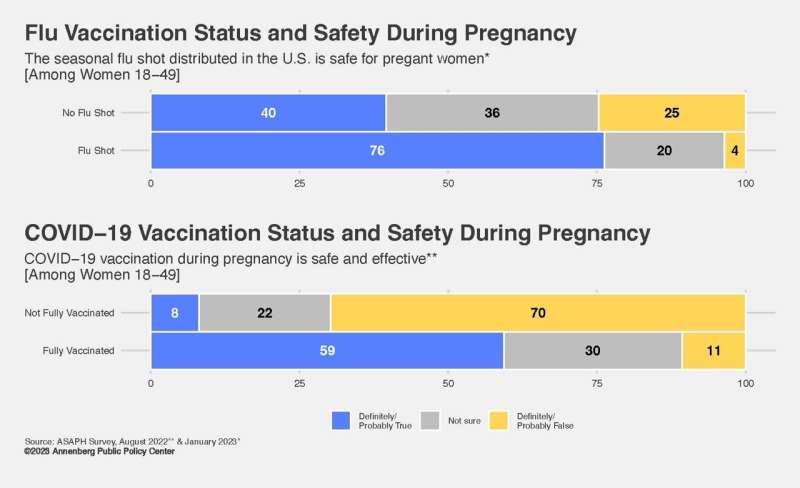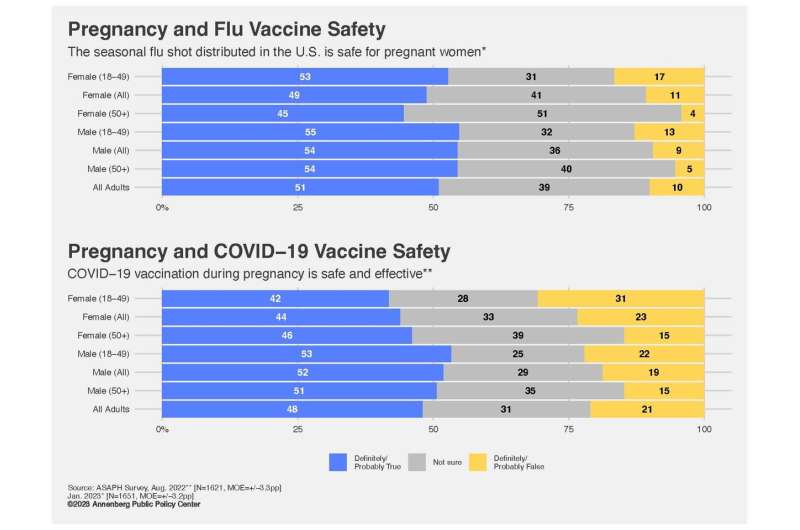Views of women of childbearing age (18-49 years old) on the safety of flu and COVID-19 vaccination during pregnancy. Source: Annenberg Public Policy Center's spring 2023 ASAPH report. Survey data on flu vaccination is from January 2023 and on COVID-19 vaccination is from August 2022. Credit: Annenberg Public Policy Center
With a vaccine on the horizon for RSV, respiratory syncytial virus, that is designed to protect pregnant people and their fetuses, new survey research finds that women of childbearing age are more doubtful than other adults about the safety of existing, recommended vaccines that can protect them from two other illnesses: the seasonal flu and COVID-19.
Research from the Annenberg Public Policy Center (APPC) shows that higher percentages of women of childbearing age (18 to 49 years old) do not think that vaccination against COVID-19 and the flu during pregnancy is safe, when compared with women age 50 and older and all adult men. The survey findings are contained in APPC's second Annenberg Science and Public Health Knowledge Monitor, which is based on 10 waves of a nationally representative panel survey of U.S. adults, with the most recent wave conducted with over 1,600 U.S. adults in January 2023.
Although a majority (53%) of women of childbearing age know that the seasonal flu vaccine "is safe for pregnant women," 17% of women of childbearing age incorrectly think that is false. Doubts that the vaccine is safe for pregnant women are held by a much larger percentage of women of childbearing age (17%) than women 50 years old and older (4%) or adult men (9%).
This trend is even more pronounced with the COVID-19 vaccine. As seen in a prior wave of the survey, in August 2022, just over 4 in 10 women (42%) of childbearing age know that COVID-19 vaccination during pregnancy is safe and effective. But nearly a third (31%) of women of childbearing age incorrectly think it is false to say that COVID-19 vaccination during pregnancy is safe and effective. Many more women of childbearing age doubt the safety and effectiveness of COVID-19 vaccination during pregnancy (31%) than older women (15%) or adult men (19%).
Views of COVID-19 and flu vaccine safety during pregnancy. From the Annenberg Public Policy Center's spring 2023 ASAPH report. Data on flu vaccine from January 2023 (n=1,657) and on COVID-19 vaccine from August 2022 (n=1,621). Credit: Annenberg Public Policy Center
"Because the COVID and flu vaccines help protect both those who are pregnant and their infants, dispatching misconceptions about them should be a public health priority," said Kathleen Hall Jamieson, director of the Annenberg Public Policy Center of the University of Pennsylvania. "That women of childbearing age are showing doubt in the safety of current, authorized vaccines is worrisome."
The report finds differences among women of childbearing age depending on vaccination status:
- Flu: The U.S. seasonal flu shot is considered safe for pregnant women by three-quarters (76%) of women of childbearing age who indicate they are vaccinated against the flu but only by 40% of those who did not report having a flu shot.
- COVID-19: The COVID-19 vaccination during pregnancy is considered safe and effective by 59% of women of childbearing age who report having had the primary series of COVID-19 vaccine shots but only 8% of those who did not report taking COVID vaccines.
- Uncertainty: Large numbers of people—especially, women age 50 and older—are not sure if the two vaccines are safe during pregnancy. Among women 50 and older, 39% are not sure if the COVID-19 vaccine is safe and effective during pregnancy, and over half (51%) are not sure if the flu shot is safe for pregnant women.
The Centers for Disease Control and Prevention (CDC) recommends both the flu shot and a COVID-19 vaccine for pregnant people.
More information: Report: cdn.annenbergpublicpolicycente … _Spring_2023_web.pdf
Provided by Annenberg Public Policy Center of the University of Pennsylvania

























